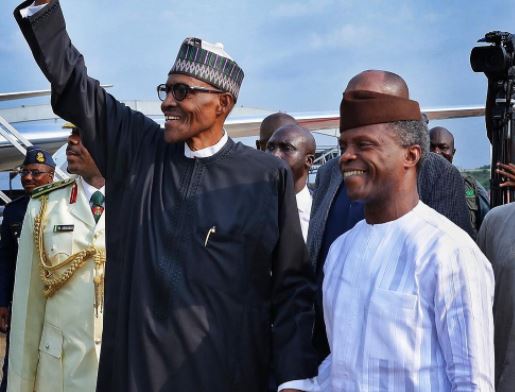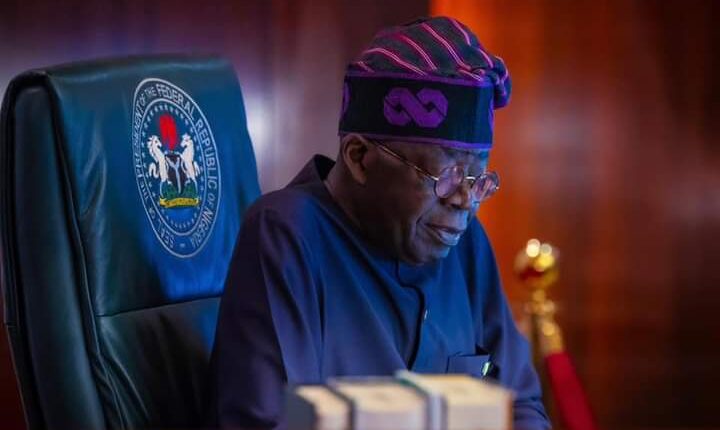Politics
HERDSMEN/FARMERS CLASHES: NEC WORKING GROUP RECOMMENDS RANCHING IN 5 STATES *Says ranching sustainable model for livestock industry *Agriculture has contributed about 27% to the expansion of the Nigerian economy in 35 years
Published
6 years agoon

Related
Sahara weekly online is published by First Sahara weekly international. contact saharaweekly@yahoo.com

You may like
Politics
PUBLIC NOTICE: URGENT APPEAL FOR PEACE AND SECURITY IN RIVERS STATE: A CALL TO ACTION FOR THE PRESIDENT*
Published
3 days agoon
April 22, 2024**PUBLIC NOTICE: URGENT APPEAL FOR PEACE AND SECURITY IN RIVERS STATE: A CALL TO ACTION FOR THE PRESIDENT**
Dear Esteemed Citizens of Nigeria,
As concerned citizens and representatives of the Dwellers of Coastal and Waterways Communities of Africa (DCWCA), our hearts weigh heavy with concern for the safety and security of our beloved nation, particularly in Rivers State. Recent developments have seen allover the internet news online a troubling plot that threatens to undermine the peace and stability painstakingly built by our coastal communities.
We are gravely disturbed by reports indicating a sinister scheme aimed at disrupting the commendable efforts of Royal Fouchee Security Limited, spearheaded by the esteemed Alhaji Mujahid Dokubo Asari. It pains us deeply to learn that the very guardians of our security, the Nigeria Security Agencies, are allegedly orchestrating an assault on the dedicated workers of Royal Fouchee Security Agency and other private security entities in Rivers State.
In this hour of uncertainty, we turn our eyes to the highest office of the land, the esteemed President of Nigeria, with an impassioned plea for intervention. Mr. President, we beseech you to heed our call and use your authority to halt any actions that may endanger the lives and well-being of our coastal citizens. Your decisive action is imperative in preventing further escalation of tensions and preserving the peace that is the lifeblood of our coastal communities.
While we cannot definitively prove the political undertones behind these alarming developments, the whispers of suspicion linger in the air. It is incumbent upon our leaders to rise above partisan interests and prioritize the safety and security of every Nigerian, particularly those in our coastal regions who are vulnerable to various challenges.
Let us not forget the lessons of our past, where political differences were allowed to sow seeds of discord and division among our coastal brethren. Instead, let us unite in solidarity, transcending political boundaries to safeguard the sanctity of our democracy and the welfare of our coastal people.
Mr. President, we implore you to intervene swiftly and decisively, sending a clear message that the security and well-being of every coastal Nigerian is non-negotiable. Your actions today will shape the destiny of our nation and reaffirm our collective commitment to peace, unity, and progress.
With unwavering hope and trust in your leadership,
Dwellers of Coastal and Waterways Communities of Africa (DCWCA)
[Tom Inko-Tariah ACI arb
President/CEO]
Related
Politics
Edi Abali Group Raises Alarm Over Security Threat to Ancestral Home, Assets of Alhaji Mujahid Abubakr Dokubo-Asari
Published
4 days agoon
April 21, 2024
Edi Abali Group Raises Alarm Over Security Threat to Ancestral Home, Assets of Alhaji Mujahid Abubakr Dokubo-Asari
by The Army
Sahara Weekly Reports That The Edi Abali Group has raised an alarm concerning a security threat to the ancestral home and assets of Alhaji Mujahid Abubakr Dokubo-Asari, the Paramount Ruler of Edi Abali Group of War Canoe and Chieftaincy Houses in the Kalabari Kingdom of Rivers State, by the military.
In a public notice issued by the Edi Abali Group it states that credible intelligence has revealed plans by elements within the 103 Battalion of the Nigerian Army in Obuama to provoke a confrontation and disrupt the peace in the area.
According to the notice, the plot specifically targets Alhaji Mujahid Abubakr Dokubo-Asari, who is currently out of the country. The army allegedly plans to exploit his absence in order to create a crisis that could be wrongly attribited to the community members, resulting in attacks on innocent individuals. The Edi Abali Group clarifies that there are no issues between their community, the army, and Alhaji Mujahid Abubakr Dokubo-Asari or his company, Royal Fouche Services Limited.
The notice highlights that the tensions arose after Alhaji Mujahid Abubakr Dokubo-Asari spoke out about the involvement of some elements of the Nigerian Army in oil bunkering activities in the Niger Delta. These activities reportedly deprived the government of the much-needed revenue, leading to displeasure among these elements. The group believes that they are deliberately instigating a crisis involving the personnel of Royal Fouche Services to justify an attack on innocent indigenes of the Kalabari communities, particularly in Obuama where Alhaji Mujahid Abubakr Dokubo-Asari is based, as well as the 103 Battalion.
Mr Mpakaboari Pankin Braide said,
“The army in Obuama is aware of his absence from the country and plans to exploit this to create a crisis, which will be wrongly attributed to community members, leading to attacks on innocent individuals.”
The Edi Abali Group calls upon the Nigerian Army to be aware of this plot and to ensure that they are not manipulated into compromising peace and security in the area. They also highlight the proven record of collaboration between Alhaji Mujahid Abubakr Dokubo-Asari and Royal Fouche Services Limited with security agencies in combating terrorism, kidnapping, and insurgency.
The group aims to inform the public, as well as the people of Kalabari and Rivers State, about this planned provocation targeting innocent individuals, including Alhaji Mujahid Abubakr Dokubo-Asari. They emphasize his commitment to supporting President Bola Ahmed Tinubu-led Federal Government and Governor Sim Fubara-led Rivers State Governments in ensuring the safety and security of all Nigerians.
Said Mr Mpakaboari Pankin Braide
Secretary Edi Abali Group Of War Canoe and Chieftaincy Houses,
“We want the public, people of Kalabari and Rivers State to be aware of this planned provocation targeting innocent individuals, including Alhaji Mujahid Abubakr Dokubo-Asari, who remains committed to supporting the President Bola Ahmed Tinubu-led Federal Government and Governor Sim Fubara-led Rivers State Governments in ensuring safety and security for all Nigerians.”
Released and signed by;
Mr Mpakaboari Pankin Braide
Secretary Edi Abali Group Of War Canoe and Chieftaincy Houses
Related

Today, however, Nigeria is home to the largest single-train refinery in the world, with the capacity to process 650,000 barrels of crude per day
Nigeria: The Changing Governance Story
By Temitope Ajayi
Sahara Weekly Reports That Tracking many stories of remarkable progress currently taking place in Nigeria can be a challenging task. This is so because these important stories are lost to some who daily indulge in the cacophony of adverse reports. These negative news often dominates the headlines.
With a 24-hour news cycle that tends to focus mainly on distasteful narratives, several Nigerians have been made to accept the view that nothing good is happening in their country.
Those who rely on the mainstream media and social media as the only sources of news and information they consume are the worst hit by the cycle of misinformation that portrays our country as descending rapidly to the edge of the precipice. However, the reality is different: the country is making progress in leaps and bounds.
Late Swedish physician and Professor of International Health at Karolinska Institute, Hans Rosling, his son, Ola Rosling, and daughter-in-law, Anna Rosling, extensively dwell on this subject in “Factfulness: Ten Reasons We’re Wrong About the World – and Why Things Are Better Than You Think,” a book published in 2018. In the book, the authors demonstrate that most people are made to hold the wrong notion about the state of the world because the media project data, analyse trends and select stories to make people assume that things are getting worse around them. The authors assert that a majority of people view the world as poorer, less healthy, and a more dangerous place to live in than it actually is. In other words, many people believe they are living in a worse period in the history of mankind because of misinformation.
The same situation the Roslings describe in their book is at play in Nigeria, where individuals, interest groups, activists, analysts, self-serving politicians, and opposition elements constantly project and amplify negative stories.
It is as if we are in a race with those who can say the most horrible things about our country. Yet, we have an abundance of good stories to tell the world. We seem so numb to the good news that we are dismissive of breakthroughs and innovative trends. For instance, we downplay the significance of Dangote Petroleum Refinery and its possibilities to reflate the economy.
Many people forgot so soon that we had been importing petroleum products for over three decades because the state-owned refineries are moribund. Our national economy bled, and the country was in a fiscal cul-de-sac for those years as a result of subsidy payments on petroleum products.
Today, however, Nigeria is home to the largest single-train refinery in the world, with the capacity to process 650,000 barrels of crude per day. Cynics do not see this as a breakthrough.
Nigerians who are 60 years old and below started seeing modern rail infrastructure in 2016 when the All Progressives Congress-led administration of former President Muhammadu Buhari commissioned the standard gauge rail system, beginning with the Abuja-Kaduna route, later Lagos-Ibadan and then the Warri-Itakpe.
The national rail modernisation project is progressing with Kano-Katsina-Maradi and Kano-Kaduna standard gauge rail projects at different stages of completion. The contractor working on the rehabilitation of the Port Harcourt-Maiduguri narrow gauge recently announced the completion of the Port Harcourt-Aba section. While the Federal Government is rallying stakeholders to promote economic integration across the country, the Lagos State Government recently launched two metro rail lines -Blue and Red Rail lines – as part of the state’s elaborate master plan to build a modern and efficient megacity. Like Lagos State, there are visible signs of remarkable, quantifiable progress in several other states, including Kaduna, Kano, Akwa-Ibom, Rivers, Kebbi, Borno, Gombe, Oyo, Ekiti and Ogun, among others.
A few weeks ago, the President Bola Tinubu-led administration embarked on the construction of the 700 kilometres Lagos-Calabar Coastal Highway that will connect nine coastal states in another bold move to bolster economic growth further and open up the country to productive economic activities.
While it may be very easy for critics and other armchair analysts to ignore these developments and their significance to remaking Nigeria, there is no gainsaying that these projects and many more that are ongoing or about to be instituted across critical sectors are the core of President Tinubu’s Renewed Hope Agenda. Indeed, it is hard to process why the so-called critics and cynics can not see the Lagos-Calabar Highway project as a clear demonstration of the President’s commitment to harnessing the potential of our renascent Blue Economy.
Despite what is bandied by the most vociferous critics
Related
Cover Of The Week

- Energy Invest: Namibia Report Relaunches at the Namibia International Energy Conference (NIEC) 2024 April 25, 2024
- South Africa initiates second dispute complaint regarding European Union (EU) citrus fruit measures April 25, 2024
- East African Community (EAC) Multinational Road of Kenya/Uganda: Kisumu - Busia/Kakira - Malaba Expressway set to boost intra-regional trade in the Northern Corridor April 25, 2024
- President Akufo-Addo Commissions 15MWP Kaleo Solar Power Plant April 25, 2024
- Development planning is a key transformative tool to strengthen resilience and sustainable development in Africa April 25, 2024
- Animal Health Experts Gather in Kenya to Shape African Agenda for World Organisation for Animal Health (WOAH) 91st General Session ShareFacebookTwitterEmail April 25, 2024
- Economic Community of West African States (ECOWAS) Convenes West African Epidemiology Network on Drug Use (WENDU) Workshop to Validate Data and Address Regional Drug Abuse Challenges, Affirms Support for Sierra Leone April 25, 2024
- Pedal power: Community health workers in Cote d’Ivoire get on their bikes to tackle malaria in remote villages April 25, 2024
- Uganda - Speaker to Members of Parliament (MPs): Monitor Shs93 billion release for district roads April 24, 2024
- The United States Calls for an Immediate Cessation of Attacks in El Fasher, North Darfur, Sudan April 24, 2024
- Energy Invest: Namibia Report Relaunches at the Namibia International Energy Conference (NIEC) 2024 April 25, 2024
- South Africa initiates second dispute complaint regarding European Union (EU) citrus fruit measures April 25, 2024
- East African Community (EAC) Multinational Road of Kenya/Uganda: Kisumu - Busia/Kakira - Malaba Expressway set to boost intra-regional trade in the Northern Corridor April 25, 2024
- President Akufo-Addo Commissions 15MWP Kaleo Solar Power Plant April 25, 2024
- Development planning is a key transformative tool to strengthen resilience and sustainable development in Africa April 25, 2024
- Animal Health Experts Gather in Kenya to Shape African Agenda for World Organisation for Animal Health (WOAH) 91st General Session ShareFacebookTwitterEmail April 25, 2024
- Economic Community of West African States (ECOWAS) Convenes West African Epidemiology Network on Drug Use (WENDU) Workshop to Validate Data and Address Regional Drug Abuse Challenges, Affirms Support for Sierra Leone April 25, 2024
Trending
-

 Business6 months ago
Business6 months agoLeading Financial Platform, AAS Bounces Back Stronger, Better With Global Coin
-

 celebrity radar - gossips4 months ago
celebrity radar - gossips4 months agoTripple Celebration, As AAS CEO, Jesam Micheal Emerges Fintech Expert of The Year, Launches Lounge
-

 celebrity radar - gossips4 months ago
celebrity radar - gossips4 months agoJesam Micheal the philanthropist, Clears the Hospital Bills of UGEP Patients, Put Smiles On Faces Of Orphanages, Police (video)
-

 Business3 months ago
Business3 months agoFintech Guru, Jesam Micheal Opens Biggest Apple Store In Africa, Reveals Why







You must be logged in to post a comment Login